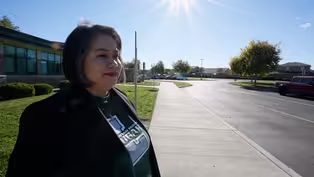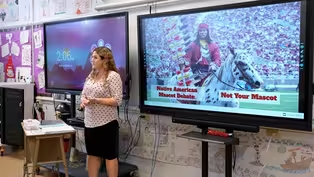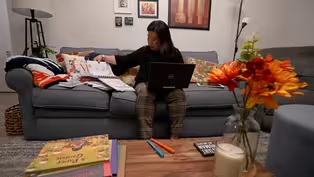Inside California Education
Hydrogen Fuel Cell Cars – Learning by Racing
Clip: Season 5 Episode 1 | 4m 20sVideo has Closed Captions
Meet students in Elk Grove racing hydrogen fuel cell remote control cars.
Meet students in Elk Grove racing hydrogen fuel cell remote control cars.
Problems playing video? | Closed Captioning Feedback
Problems playing video? | Closed Captioning Feedback
Inside California Education is a local public television program presented by KVIE
Funding for the Inside California Education series is made possible by the California Lottery, SchoolsFirst Federal Credit Union, Stuart Foundation, ScholarShare 529, and Foundation for the Los Angeles Community Colleges.
Inside California Education
Hydrogen Fuel Cell Cars – Learning by Racing
Clip: Season 5 Episode 1 | 4m 20sVideo has Closed Captions
Meet students in Elk Grove racing hydrogen fuel cell remote control cars.
Problems playing video? | Closed Captioning Feedback
How to Watch Inside California Education
Inside California Education is available to stream on pbs.org and the free PBS App, available on iPhone, Apple TV, Android TV, Android smartphones, Amazon Fire TV, Amazon Fire Tablet, Roku, Samsung Smart TV, and Vizio.
Providing Support for PBS.org
Learn Moreabout PBS online sponsorship♪♪ Michael: When you're creating the hydrogen in here, look at it because you're going to physically see the hydrogen gas forming.
Annc: These ambitious high school students are attempting to create what only a few major automakers have built- a car that runs on hydrogen fuel.
Michael: It's a really eye opener for kids to know that we have a fuel source that can power a car.
Annc: With increasing demand for renewable energy, the time couldn't be more right for the Florin High School engineering class in Elk Grove Unified to discover H2, Californias newest alternative fuel option.
Cindy: I've been really enjoying it and, like, just knowing that we're gonna build cars, it just sounds so fun.
Annc: So much so, that Cindy and her classmates have joined forces in an after school club to get their car competition-ready for the 'Hydrogen Grand Prix.'
Jesse: The fun is what draws them in.
Wow, you know, these remote controlled, uh, vehicles.
Charity: It kind of feels like you're a kid again when you're just racing.
Jesse: But they're also learning knowledge about batteries, hydrogen fuel cells.
Annc: The Hydrogen Grand Prix is a series of endurance races culminating with the World Cup in Europe.
Kids design and build their own hydrogen remote control cars and enter them in a four hour competition.
Michael: It takes that textbook knowledge that they know about the fuel cell and it brings it to life.
Annc: This hands-on teaching experience began in 2016, when Horizon Educational, known for its STEM based curriculum, launched the Grand Prix.
With backing from Hyundai, Toyota, and other leaders in the alternative fuel industry, its mission was clear.
Jesse: To propel students into not only renewable energy but also into their future careers.
Annc: That humble goal has grown into a worldwide phenomenon with 20,000 students in 13 countries taking part.
♪♪ Annc: Currently, 500 schools in California are enrolled in the Grand Prix.
That's added competition for Florin High who placed just outside the top ten in the 2022 state championships.
Jesse: It's entirely possible that they will be able to go all the way to the World Cup.
Isaiah: First, we just want to improve our car.
Annc: Their inspiration this year, the Toyota Mirai, one of the first H2 vehicles to hit the road.
Bill Elrick from the Hydrogen Fuel Cell Partnership sees why students would want some of its elements in their cars.
Bill: The vehicles that kids are making versus the basic science in the mass produced vehicles coming out for our driving pleasure is the same.
Michael: And... what-- why do... why does that matter?
Why wouldn't we just use the other ones?
Annc: It takes a team effort from all the students to create a car that can run as clean as fuel cell cars currently on the road.
Michael: They start with building a model RC car.
The kids can modify anything from the chassis, um, to the fuel cell to the tires.
The kids are pretty impressive with the ideas they come up with and so they're constantly trying to figure out how can we make the fuel cell better.
Annc: Just like a regular sized hydrogen fuel cell car, the not-so-secret weapon to these pint sized counterparts is the fuel cell stack.
It converts the hydrogen to energy, to power the battery.
Michael: I'm watching the... the kids, uh, light bulbs go on.
They'll design parts that literally hold the cortex or the brain of the hydrogen fuel cell.
Luis: We put a lot of effort into it.
Annc: And for the final step, it's time to take the car out for a road test with Teresa behind the controls.
Teresa: I'm a race car driver before I got my driver's license.
Isaiah: 3, 2, 1... Annc: And success.
Bill: These kids can get this much quicker.
So what they're doing now is... it's just super exciting for all of us.
Teresa: I feel like this is a great accomplishment.
Day in the Life – School Counselor
Video has Closed Captions
Clip: S5 Ep1 | 3m 40s | See what a “day in the life” is like for a school counselor in the Central Valley. (3m 40s)
Ethnic Studies in the Classroom
Video has Closed Captions
Clip: S5 Ep1 | 5m 37s | Learn about the new ethnic studies requirement for California high schools. (5m 37s)
Video has Closed Captions
Clip: S5 Ep1 | 6m 3s | Tour a new affordable housing unit in the Bay Area built just for teachers. (6m 3s)
Providing Support for PBS.org
Learn Moreabout PBS online sponsorship
- News and Public Affairs

Top journalists deliver compelling original analysis of the hour's headlines.

- News and Public Affairs

FRONTLINE is investigative journalism that questions, explains and changes our world.












Support for PBS provided by:
Inside California Education is a local public television program presented by KVIE
Funding for the Inside California Education series is made possible by the California Lottery, SchoolsFirst Federal Credit Union, Stuart Foundation, ScholarShare 529, and Foundation for the Los Angeles Community Colleges.


